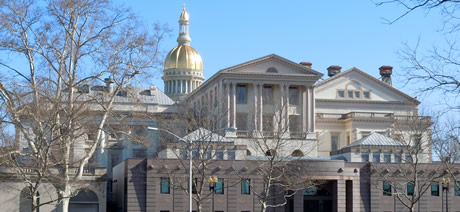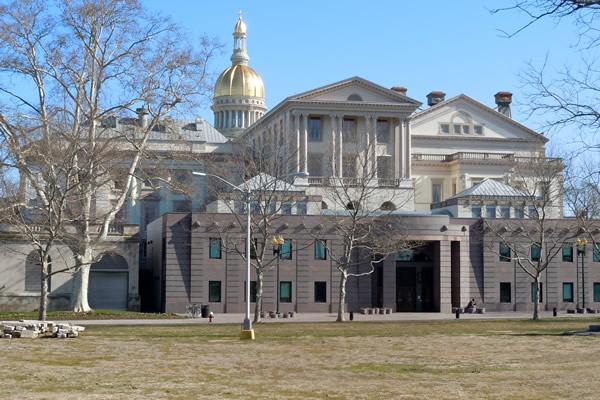National
N.J. Senate passes marriage bill, 24-16
GOP Gov. Christie vows to veto


A same-sex marriage bill passed the New Jersey Senate, Monday, just 3 votes shy of a veto-proof majority. (Photo public domain)
UPDATED WITH ADDITIONAL VOTE TALLY DATA, QUOTES AND STATISTICAL INFORMATION.
The New Jersey Senate passed a bill that would extend marriage rights to same-sex couples on a 24 to 16 vote today. The bill now heads to the Assembly for a 1 p.m. vote on Thursday.
The Marriage Equality and Religious Exemption Act was given the legislative bill number S1, a symbolic nod to the high priority that the Democratic-controlled legislature was giving to the effort. Two Republicans joined 22 Democrats in voting for the bill, while on the other side, two Democrats voted with 14 Republicans in the negative.
The bill, which Gov. Chris Christie has pledged to veto, required 21 votes to pass.
“I’m thrilled to see the New Jersey State Senate dramatically reverse its course of just a few years ago and vote to bring the freedom to marry to thousands of loving and committed New Jersey couples,” Freedom to Marry COO and South Orange resident Scott Davenport told the Blade on Monday. “I believe as more and more gay and lesbian headed families tell their stories to their friends, neighbors and legislators about why marriage matters to them that we will see at least three more hearts and minds changed in the state Senate.”
Garden State Equality board member and BlueJersey.com editor Rosi Efthim is nervous about Thursday’s Assembly vote, but is optimistic about the bill’s eventual success.
“If it passes both houses, we expect Gov. Christie’s veto, but would have until the end of the legislative session [January 2014] to override,” Efthim told the Blade, Monday.
The Democratic National Committee’s first transgender member, and New Jersey resident Babs Siperstein believes the bill will pass in the Assembly on Thursday, and thinks veto override is a good possibility.
“There is a chance for victory, and there is obviously a lot more work to be done,” Siperstein told the Blade. “There is a window of opportunity with a number of political variables, but I believe it can be done.”
In January, Christie elicited praise from LGBT activists in the Garden State when he nominated an openly gay man to the New Jersey Supreme Court, Bruce Harris, the gay African-American mayor of Chatham Borough N.J. But activists were disappointed when Christie reaffirmed his pledge to veto a marriage bill that same week.
In Sunday’s New York Times, editors took Christie to task for his vow to veto the bill, calling his threat to block the effort “not only disgraceful, but against the tide of history.”
University of California Los Angeles-based LGBT think tank, the Williams Institute, estimates that 16,875 same-sex couples live in New Jersey, with nearly 3,000 of those couples raising an estimated 6,650 total children. New Jersey is likely to generate $48 to $119 million for the state economy in same-sex wedding-related business if the bill passes, according to the think tank. It said that 4,447 of the nearly 17,000 same-sex couples in the Garden State already identify one another as “spouses.”
On Jan. 7, 2010, a bill calling for the extension of marriage rights to same-sex couples failed in the New Jersey Senate on a vote of 14-20. Senate leadership has since become much more involved in pressuring the chamber in favor of the bill, with a greater emphasis on lobbying the 24 Democrats and 16 Republicans than ever before.
The bill is sponsored in the Senate by Majority Leader Loretta Weinberg, Sen. Raymond Lesniak, and Senate President Steve Sweeney, all Democrats.
While the Senate bill passed by 8 votes today, both houses will need to raise two-thirds majority support to overcome Christie’s threatened veto. In the Senate, supporters of the bill will need an additional 3 votes to reach the 27 vote threshold.
This story is still developing please return to WashingtonBlade.com for continued updates.

The Comings & Goings column is about sharing the professional successes of our community. We want to recognize those landing new jobs, new clients for their business, joining boards of organizations and other achievements. Please share your successes with us at [email protected].
Congratulations to Gil Pontes III on his recent appointment to the Financial Advisory Board for the City of Wilton Manors, Fla. Upon being appointed he said, “I’m honored to join the Financial Advisory Board for the City of Wilton Manors at such an important moment for our community. In my role as Executive Director of the NextGen Chamber of Commerce, I spend much of my time focused on economic growth, fiscal sustainability, and the long-term competitiveness of emerging business leaders. I look forward to bringing that perspective to Wilton Manors — helping ensure responsible stewardship of public resources while supporting a vibrant, inclusive local economy.”
Pontes is a nonprofit executive with years of development, operations, budget, management, and strategic planning experience in 501(c)(3), 501(c)(4), and political organizations. Pontes is currently executive director of NextGen, Chamber of Commerce. NextGen Chamber’s mission is to “empower emerging business leaders by generating insights, encouraging engagement, and nurturing leadership development to shape the future economy.” Prior to that he served as managing director of The Nora Project, and director of development also at The Nora Project. He has held a number of other positions including Major Gifts Officer, Thundermist Health Center, and has worked in both real estate and banking including as Business Solutions Adviser, Ironwood Financial. For three years he was a Selectman, Town of Berkley, Mass. In that role, he managed HR and general governance for town government. There were 200+ staff and 6,500 constituents. He balanced a $20,000,000 budget annually, established an Economic Development Committee, and hired the first town administrator.
Pontes earned his bachelor’s degree in political science from the University of Massachusetts, Dartmouth.
Kansas
ACLU sues Kansas over law invalidating trans residents’ IDs
A new Kansas bill requires transgender residents to have their driver’s licenses reflect their sex assigned at birth, invalidating current licenses.

Transgender people across Kansas received letters in the mail on Wednesday demanding the immediate surrender of their driver’s licenses following passage of one of the harshest transgender bathroom bans in the nation. Now the American Civil Liberties Union is filing a lawsuit to block the ban and protect transgender residents from what advocates describe as “sweeping” and “punitive” consequences.
Independent journalist Erin Reed broke the story Wednesday after lawmakers approved House Substitute for Senate Bill 244. In her reporting, Reed included a photo of the letter sent to transgender Kansans, requiring them to obtain a driver’s license that reflects their sex assigned at birth rather than the gender with which they identify.
According to the reporting, transgender Kansans must surrender their driver’s licenses and that their current credentials — regardless of expiration date — will be considered invalid upon the law’s publication. The move effectively nullifies previously issued identification documents, creating immediate uncertainty for those impacted.
House Substitute for Senate Bill 244 also stipulates that any transgender person caught driving without a valid license could face a class B misdemeanor, punishable by up to six months in jail and a $1,000 fine. That potential penalty adds a criminal dimension to what began as an administrative action. It also compounds the legal risks for transgender Kansans, as the state already requires county jails to house inmates according to sex assigned at birth — a policy that advocates say can place transgender detainees at heightened risk.
Beyond identification issues, SB 244 not only bans transgender people from using restrooms that match their gender identity in government buildings — including libraries, courthouses, state parks, hospitals, and interstate rest stops — with the possibility for criminal penalties, but also allows for what critics have described as a “bathroom bounty hunter” provision. The measure permits anyone who encounters a transgender person in a restroom — including potentially in private businesses — to sue them for large sums of money, dramatically expanding the scope of enforcement beyond government authorities.
The lawsuit challenging SB 244 was filed today in the District Court of Douglas County on behalf of anonymous plaintiffs Daniel Doe and Matthew Moe by the American Civil Liberties Union, the ACLU of Kansas, and Ballard Spahr LLP. The complaint argues that SB 244 violates the Kansas Constitution’s protections for personal autonomy, privacy, equality under the law, due process, and freedom of speech.
Additionally, the American Civil Liberties Union filed a temporary restraining order on behalf of the anonymous plaintiffs, arguing that the order — followed by a temporary injunction — is necessary to prevent the “irreparable harm” that would result from SB 244.
State Rep. Abi Boatman, a Wichita Democrat and the only transgender member of the Kansas Legislature, told the Kansas City Star on Wednesday that “persecution is the point.”
“This legislation is a direct attack on the dignity and humanity of transgender Kansans,” said Monica Bennett, legal director of the ACLU of Kansas. “It undermines our state’s strong constitutional protections against government overreach and persecution.”
“SB 244 is a cruel and craven threat to public safety all in the name of fostering fear, division, and paranoia,” said Harper Seldin, senior staff attorney for the ACLU’s LGBTQ & HIV Rights Project. “The invalidation of state-issued IDs threatens to out transgender people against their will every time they apply for a job, rent an apartment, or interact with police. Taken as a whole, SB 244 is a transparent attempt to deny transgender people autonomy over their own identities and push them out of public life altogether.”
“SB 244 presents a state-sanctioned attack on transgender people aimed at silencing, dehumanizing, and alienating Kansans whose gender identity does not conform to the state legislature’s preferences,” said Heather St. Clair, a Ballard Spahr litigator working on the case. “Ballard Spahr is committed to standing with the ACLU and the plaintiffs in fighting on behalf of transgender Kansans for a remedy against the injustices presented by SB 244, and is dedicated to protecting the constitutional rights jeopardized by this new law.”
National
After layoffs at Advocate, parent company acquires ‘Them’ from Conde Nast
Top editorial staff let go last week

Former staff members at the Advocate and Out magazines revealed that parent company Equalpride laid off a number of employees late last week.
Those let go included Advocate editor-in-chief Alex Cooper, Pride.com editor-in-chief Rachel Shatto, brand partnerships manager Erin Manley, community editor Marie-Adélina de la Ferriére, and Out magazine staff writers Moises Mendez and Bernardo Sim, according to a report in Hollywood Reporter.
Cooper, who joined the company in 2021, posted to social media that, “Few people have had the privilege of leading this legendary LGBTQ+ news outlet, and I’m deeply honored to have been one of them. To my team: thank you for the last four years. You’ve been the best. For those also affected today, please let me know how I can support you.”
The Advocate’s PR firm when reached by the Blade said it no longer represents the company. Emails to the Advocate went unanswered.
Equalpride on Friday announced it acquired “Them,” a digital LGBTQ outlet founded in 2017 by Conde Nast.
“Equalpride exists to elevate, celebrate and protect LGBTQ+ storytelling at scale,” Equalpride CEO Mark Berryhill said according to Hollywood Reporter. “By combining the strengths of our brands with this respected digital platform, we’re creating a unified ecosystem that delivers even more impact for our audiences, advertisers, and community partners.”
It’s not clear if “Them” staff would take over editorial responsibilities for the Advocate and Out.


















